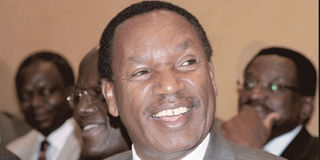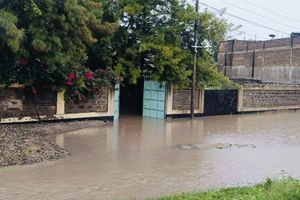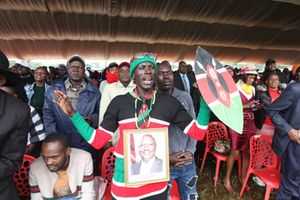Happening Now: Labour Day celebrations at Uhuru Gardens
Kosgey: My ICC nightmare

PHOTO | FILE Mr Henry Kiprono Kosgey.
What you need to know:
- ODM chairman breaks his silence on the most traumatic chapter of his life
Palpable anxiety. These two words do not even come close to accurately describe the public mood in Kenya on Wednesday, December 15, 2010.
The country had been kept waiting, and people’s patience was stretched to the limits.
“D-Day for Ocampo Six,” said a newspaper headline.
Two days earlier, President Kibaki had convened a special Cabinet meeting and secured a resolution requiring the government to set up a local court to try people suspected of having sponsored the post-election violence of 2007 and 2008.
On this day, Mr Luis Moreno-Ocampo, then chief prosecutor of the International Criminal Court (ICC), was set to name six individuals suspected to bear the greatest responsibility for the violence.
So much anxiety
Mr Henry Kiprono Kosgey had some business in town. “There was so much anxiety in the air,” recalls the Tinderet MP.
“The media did not help. Many TV stations were live, ready to make the announcement. It heightened the anticipation,” he says. In the midst of this anxiety, Mr Kosgey decided to return home and wait for the announcement.
In a conversation with the Sunday Nation, he broke his silence over the ICC matter, and for the first time, took us through the emotions of what he calls the most “traumatising and difficult” experience.
“I went back home at about 11.30 a.m. and sat with my wife and children around a television set. I was extremely shocked to hear my name. It was a very tense moment,” he says, with strong breaks between his sentences.
The suspended Industrialisation minister could not reconcile himself to the announcement. In one moment the world around him had changed. “It came as a great shock to me because I knew I had not participated in the violence. I had just been sitting there unaware that somebody had implicated me. It was traumatising.”
Others mentioned were Uhuru Kenyatta, William Ruto, Francis Muthaura, Hussein Ali and Joshua arap Sang. The six thus faced crimes against humanity charges at The Hague-based court.
Apparently, Mr Moreno-Ocampo had informed President Kibaki and Prime Minister Raila Odinga of the six names well ahead of the dramatic announcement, but they did not inform the men themselves. But, somehow, the disturbing information found its way to the suspects. This, he reckons, informed the special Cabinet meeting that pushed for a local court.
“We had caught wind of it. I think the two principals had been informed, and it leaked to us,” said the Orange Democratic Movement chairman.
So Mr Kosgey was at home to confirm whether it was indeed true that his name was on the Ocampo List.
Four issues tortured him. There was the prospect of being arrested and hauled off to be prosecuted in a foreign land, the magnitude of the charges which included mass murder, the reaction of Kenyans and how to explain the turn of events to his family.
But he had been confident he would not be on the list because no one had contacted him as part of the initial investigations.
“There were no investigations and nobody had approached me over the matter. I knew that they would have talked to me if they had any adverse information on me.”
The Rome Statute that created the ICC demands that the prosecutor investigate both exonerating and incriminating evidence.
Mr Kosgey’s phone rang throughout, flashing messages of encouragement from political allies, constituents and relatives.
“Be courageous. Be brave. Be strong. Take heart. We’ll pray for you. We are with you,” to mention a few.
But at that point he found them meaningless.
“People can send you all manner of comfort messages in times of difficulty. But it is the affected and his family who feel the weight of the matter at hand.”
Mr Odinga was away on official trip in Kampala when the names were made public.
He flew back that evening and immediately headed to Mr Kosgey’s home accompanied by Lands minister James Orengo and senior staff in the Prime Minister’s office.
“We had supper. Raila was in shock. He didn’t seem to know what to say,” Mr Kosgey recalls.
It was that he became reconciled to the reality that he was facing serious allegations which he had to fight legally.
Unlike the other suspects, Mr Kosgey adopted a fairly different strategy.
He went quiet, away from the media. Mr Kosgey, Mr Ruto and Mr Sang were accused of being part of a network that masterminded the killing and displacement of perceived PNU supporters from the Rift Valley following the disputed 2007 presidential election results.
But the journey ahead was not easy, starting with the first trip to the ICC on April 7, 2011 for the initial appearance hearings when the men introduced themselves to the court and the charges against them were read out.
“It was not easy, but I had the support of my family. I had travelled with my two sons, one of whom was my lawyer.
“We had prayed a lot ahead of our journey and were overwhelmed by the support of Kenyans who turned up at the airport to see us off.”
But, as Kenyans watched the ICC proceedings live from home, the major question was: What was going on in the minds of the six as they sat in that courtroom, far away in a cold European city, facing the extremely courteous but firm Judge Ekaterina Trendafilova.
“It was a tense moment. We were in a suspended state of mind,” says Kosgey who noted that no adjective can accurately describe the feelings of an individual, seated in a foreign court whose proceedings are beamed live internationally.
“Facing crimes against humanity charges is traumatising. It does not take a weak man to go through. I will not wish anybody to go through that experience.”
Initial appearance
The day of the initial appearance hearings was particularly difficult.
“But we had steadied our nerves, reconciled our minds and made peace with our hearts. I drew my strength from the fact that I was innocent and had the support of my family.”
Many Kenyans would remember the picture of a crestfallen, yet dignified, and stoic gentleman introducing himself to the judges with remarkable humility and calm.
“My name is Henry Kiprono Kosgey from Nandi County,” he said, repeating “Nandi County” with a cold stare at the pre-trial judges.
Mr Kosgey’s case revolved around the testimony of witness No 6 who alleged that the Tinderet MP had attended a violence planning meeting at the Aldai home of former GSU Commandant Samson Cheramboss and three others in Nandi County.
Mr Cheramboss has denied ever holding such a meeting in the presence of Mr Ruto.
Mr Kosgey says the allegation opened one of the darkest chapters in his life.
He would take a walk in the streets of Nairobi to gauge the public attitude towards him.
“I would walk to a bookshop in the city centre to buy a book. Going by the messages of encouragement from ordinary folk, I was comforted that a good number of Kenyans did not believe the accusations against me.” But, in retrospect, Mr Kosgey thinks that it was a decision to reluctantly accompany Mr Odinga on a campaign trip to Kilgoris December 14, 2007 that came to rescue him from the jaws of the ICC.
This, he says, is one of three days he will forever remember in his life.
The others are December 15, 2010, and January 23, 2012.
The father of South Mugirango MP Omingo Magara died during the presidential campaigns and the Orange top brass thronged to his burial on December 14, 2007.
That same day, the ODM brigade was to address a rally at Dikirr, a dusty small town 40 kilometres east of Kilgoris.
Mr Odinga was set to address another campaign meeting in Kitale the following day.
Mr Kosgey did not want to attend the Dikirr meeting. Instead, he wanted to leave Magara’s home at about 3 p.m. and head straight to his Olessos home in Nandi County to prepare the ground for the ODM rally in Kitale, about 55 km from his place.
Mr Odinga insisted that Mr Kosgey attend the Dikirr meeting. The ODM chairman reluctantly agreed to go to Dikirr. But there was a challenge: travelling from South Mugirango to Dikirr involved driving more than 100 kilometres on long stretches of bad road. He sought a ride in Mr Odinga’s chopper.
“He told me that he had [Najib] Balala on board and asked me to travel to Kilgoris by road. At Kilgoris, he would off-load one of his bodyguards to create space for me on the trip to Kitale,” he recalls.
Mr Kosgey obliged. But he arrived in Kilgoris late when Mr Odinga and other members of the ODM Pentagon were making the last speeches.
And, as agreed, Mr Odinga created space for him in the chopper, and they flew to Kitale arriving at 7 p.m. Mr Kosgey and other ODM leaders spent the night in Kitale.
This is the night the prosecutor alleged that Mr Kosgey was in Cheramboss’ home.
“I was very far from Cheramboss’ home — Kobujoi. I was very far from the area of the alleged meetings. Raila had made me to spend the night in far-away Kitale.”
Mr Kosgey reckons that had Mr Odinga not insisted on him attending the Dikirr rally, he would have slept at his home, which is near Mr Cheramboss’ place where he is alleged to have attended a violence planning meeting. Here, he thinks, the prosecutor would have used proximity to argue that Mr Kosgey had attended the alleged meeting.
Making the distance
Mr Cheramboss’ Kobujoi home is about 140 km from Kitale. Mr Kosgey’s Olessos home is another 55 km from Kobujoi, making the distance from Kitale nearly 200 km to the south east.
In his defence, Mr Kosgey’s lawyers produced the helicopter logs, hotel accommodation receipts, a video clip of the Kilgoris rally and Magara’s father’s funeral programme.
“We were able to prove that I was nowhere near the area of the alleged meeting. I was in Kitale at the time of the meeting if ever there was one.”
The ICC declined to confirm charges against Mr Kosgey because the single witness testimony was not collaborated.
On January 23, the pre-trial judges concluded that there was not sufficient evidence to establish substantial grounds to believe that Mr Kosgey was criminally responsible in the case.
“It was as tense as the day our names were mentioned.
Again he gathered around a TV set with members of his family.
“I was relieved to hear that my case had been dropped. I kept the faith and I knew that in the fullness of time, I will be vindicated.”




